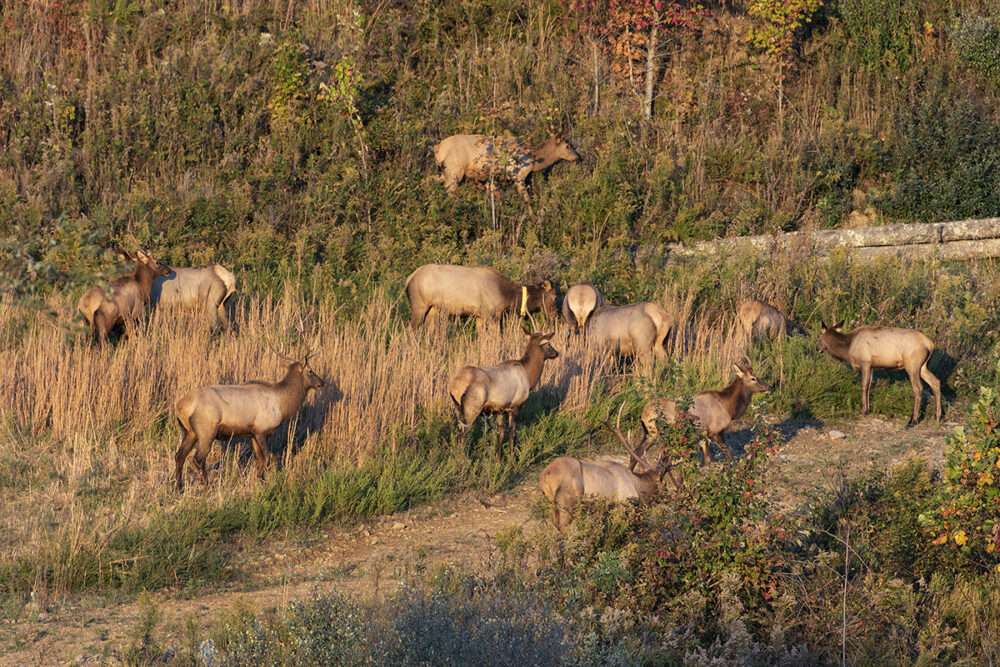
Elk herd in Virginia. Photo by Lynda Richardson / DWR
By Molly Kirk
The wildlife regulation proposals on hunting, trapping, and possession of terrestrial wildlife that are currently open to public comment include the introduction of a special elk hunting license.
Management of the elk herd that was established in Southwest Virginia between 2012 and 2014 aims to maintain a sustainable population of elk for the benefit of all constituents of the Commonwealth according to the 10-year Elk Management Plan developed in 2019 by the Department of Wildlife Resources.
“These regulations would allow us to realize yet another benefit associated with the VA elk restoration and elk management,” said Shannon Bowling, DWR regional wildlife manager. “Our constituents will have the ability to be a part of a rare and unique opportunity to pursue elk within Virginia’s Elk Management Zone. Beyond the opportunity and the experience it provides to a hunter, hunting is also the preferred option for population management within Virginia, as outlined in our Virginia Elk Management Plan.”
Starting in 2012 and continuing into 2014, DWR released 75 elk into a designated Elk Restoration Zone (now the Elk Management Zone, EMZ) comprised of three counties: Buchanan, Dickenson, and Wise. A prohibition was imposed on the harvest of any elk within said zone to allow population establishment and growth on the reclaimed mined lands where the restoration was focus. Outside the EMZ, it was and still is legal to harvest an elk under a valid deer tag.
The new Special Elk Hunting License would be applicable within the EMZ, establishing separate regulations for elk hunting outside and within the EMZ. The proposed sections related to season bag limit establishment, blaze color requirement, and tag validation and reporting are all consistent with subsequent sections in other big game species regulations. Bag limits will be established to “manage elk in a manner that maintains a healthy and viable population within the EMZ” as prescribed by Conservation Goal 1 in the Virginia Elk Management Plan. The proposed seven-day open season would provide a balance between providing an adequate opportunity for hunters to pursue elk and minimizing potential disturbance on the overall elk herd.
“The elk hunting opportunities that these regulations would allow offer opportunities for further expansion on already growing ecotourism—mainly focused on elk and wildlife viewing—that has resulted from the elk restoration efforts in Buchanan County,” Bowling said.
The random drawing license program will be the most common means that a special elk hunting license is awarded. This process will provide an opportunity for any individual to draw a special elk hunting license while also prioritizing the opportunity for residents of Virginia and those applicants who reside within the Elk Management Zone. This prioritization of special elk hunting licenses, awarded through the random draw, seeks to balance the benefits that elk provide through hunting opportunities and any potential negative impact from elk within the EMZ.
Providing elk hunters with adequate lands to pursue elk will play an important role in the success the special elk hunting license program. The opportunity for landowners to earn points toward a special elk hunting license in exchange for providing access for elk hunting on their property (>50 ac), as proposed in regulation, is a non-traditional path to promote public access and provide elk hunters added opportunity. In addition, there is a proposed license program permitting the transfer of special elk licenses to an individual, cooperator, or organization whose mission is to promote and ensure the conservation of Virginia’s wildlife resources and/or to promote opportunities for hunting, fishing, trapping, boating or other wildlife-related recreation within Virginia. That cooperator or organization must demonstrates a history and ability to effectively implement wildlife management and outline a plan for generating the funding, designing a wildlife management project, and executing that project within the EMZ.
Comments on the proposed regulations can be made online and also:
- during the May 27, 2021 meeting of the Board
- postal-mailed to the Virginia Department of Wildlife Resources, Attn: Policy Analyst and Regulatory Coordinator, P.O. Box 90778, Henrico, Virginia 23228
- emailed to RegComments@dwr.virginia.gov
Comments must be in writing and accompanied by the name, address and telephone number of the party offering them. Comments submitted other than at the May 27, 2021 Board meeting must be received no later than May 10, 2021.
After hearing public comment on the proposed amendments at the May 27 Board meeting, the Board anticipates adopting final regulation amendments that will be effective on August 1, 2021 for the 2021–2022 hunting and trapping seasons.

